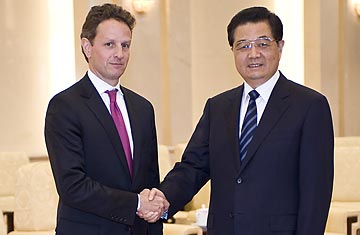
U.S. Treasury Secretary Timothy Geithner, left, is greeted by Chinese President Hu Jintao
Tim Geithner concluded his maiden journey to China as Treasury Secretary on Tuesday by meeting the two most powerful men in the nation that is the biggest creditor of the United States: President Hu Jintao and Prime Minister Wen Jiabao. The man whose name now graces dollar bills in the United States was, in effect, meeting his bankers. But if those two pressed the Treasury Secretary about whether their government's huge investments in the U.S. are safe — the way some of their colleagues "grilled" Fisher, Geithner's former colleague on the Federal Reserve Board — it's a secret. Indeed, the Treasury Secretary told reporters that, far from an obsession about whether the U.S. was going to reflate its way out of trouble (and debase its currency in the process), the issue didn't even come up in his meetings on Monday. "I actually haven't been [asked about it]," Geithner said, perhaps chafing a bit at the presumption that the U.S. needs to reassure the Chinese of its creditworthiness. "The economic leadership here," he continued, "has a very sophisticated understanding about where we are and what we are doing. We are going to have to bring down our fiscal deficit and walk back these extraordinary interventions in the financial sector, but we are completely committed to doing that — and they understand that."
But the concern of the Chinese is not a figment of anyone's imagination. It was just in March, in fact, that Premier Wen himself prodded Washington for reassurance. At the annual meeting of China's National People's Congress in Beijing, Wen said, "We have lent a massive amount of capital to the United States, and of course we are concerned about the security of our assets. To speak truthfully, I do indeed have some worries. So I call on the United States to maintain its creditworthiness, abide by its commitments and ensure the security of China's assets." (Read "How to Know When the Economy Is Turning Up.")
As messages go, it doesn't get much clearer than that. But Geithner has known all along that there were two critical first steps the U.S. had to take in order to begin the process of reassuring its creditors. It had to demonstrate that it had a grip on the banking crisis — that financial Armageddon was not at hand — and it needed to show the world that a broad, macroeconomic turnaround wasn't too far down the road. Geithner is loathe to talk publicly about market behavior, but Treasury officials believe that a tightening of credit-market spreads shows an improvement in confidence. "Risk premia are receding in response to signs of stabilization," says an official familiar with Treasury's thinking. And the recent slight rise in interest rates demonstrates nothing except a market beginning to return to normalcy, not one getting spooked by fears of inflation. Consider that so-called TIPS — inflation-protected bonds — yield 1.5% on the five-year bond and just 1.9% on the 10-year. No sign of incipient inflationary panic there. To China and to everyone else watching, the U.S. would cite that as progress — and reasonably so.
And just yesterday — fortuitous timing for Geithner — both the U.S. and China reported economic data that buoyed equity markets on both sides of the Pacific. In China, the monthly purchasing manager's index for manufacturing was stronger than expected, showing "for the first time that policy is really gaining traction [in China]," says Eric Fishwick, head of economic research at CLSA Asia Pacific Markets in Hong Kong. At the same time, in the U.S., data showed that personal income in April rose 0.5%, an encouraging number. On a day when General Motors, once the world's largest industrial corporation, declared bankruptcy, the Dow Jones industrial average rose 2.6%. (See 25 people to blame for the financial crisis.)
Thus, as he headed into his key meetings in China, Geithner actually had an ever so slight wind at his back. He acknowledged as much, in fact, upon greeting Prime Minister Wen: "At the time we met in New York [last autumn]," Geithner told him, "it was a time of great panic. But we are happy to see small signs of recovery."
Wen welcomed Geithner warmly in his public remarks; the chill in China's rhetoric of just a couple of months ago is now gone, as is any notion that Beijing will stop buying huge amounts of Treasury debt anytime soon. In fact, in March, China's direct holdings of U.S. Treasury securities alone (excluding so-called agency debt issued by Fannie Mae and Freddie Mac) rose $23.7 billion, to reach a new record of $768 billion, according to preliminary U.S. data, making China far and away America's biggest creditor.
Geithner repeats constantly, both in public and in private, that the Obama Administration is committed to returning to fiscal responsibility — pushing deficits down to 3% of GDP — in the "medium term." On his first visit to Beijing, the Treasury Secretary could claim to his Chinese hosts that the necessary precondition for that return to fiscal sanity — a little bit of economic growth — might be on the horizon. Considering where things were the last time he met China's Premier — in October of last year, when the global economy was, as Geithner says now, "falling off a cliff" — that's not nothing.
